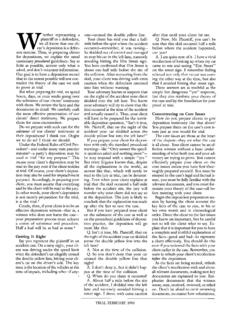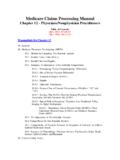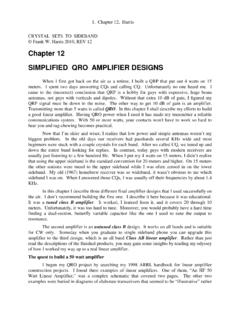Transcription of Chapter 12 Final
1 12 i Chapter 12 Motions for Orders of Compliance Andrew M. Zeitlin Introduction .. 12 1 Sanctionable Conduct and Available 12 2 Standard for Imposing Sanctions .. 12 3 Procedure for Resolving Discovery Disputes or Seeking Sanctions .. 12 6 EXHIBIT 12A Defendants Motion to Compel Production of Medical Records .. 12 7 EXHIBIT 12B Defendant s Motion to Compel Plaintiff s Signature on Authorization Forms Required to Obtain Plaintiff s Updated Medical 11 EXHIBIT 12C Plaintiff s Motion to Compel and for Sanctions .. 12 15 EXHIBIT 12D Motion for Order of 12 21 EXHIBIT 12E Objection to Motion to Compel .. 12 25 EXHIBIT 12F Defendants Objection to Motion to Compel Production .. 12 29 EXHIBIT 12G Affidavit in Support of Defendant s Objection to Motion to Compel Discovery.
2 12 33 EXHIBIT 12H Discovery and Deposition Dispute Order .. 12 35 EXHIBIT 12I Request for Adjudication of Discovery or Deposition Dispute (Form JD-CV-119).. 12 37 DISCOVERY & DEPOSITIONS IN CONNECTICUT 12 ii 12 1 Chapter 12 Motions for Orders of Compliance Andrew M. Zeitlin Scope Note This Chapter discusses motions to compel compliance with discovery requests. It describes the conduct that is deemed sanctionable under the Connecticut Practice Book, the sanc-tions that are available, the standard for imposing sanctions, and the procedure for resolving discovery disputes and seek-ing sanctions. The Chapter also includes as exhibits sample motions and objections, the statewide standing order concern-ing discovery disputes, and the court form necessary to seek adjudication of discovery disputes under the standing order.
3 INTRODUCTION Motions for orders of compliance (or motions to compel, as they are frequently called) are governed by Section 13-14 of the Connecticut Practice Book. As in many jurisdictions, judges in Connecticut generally prefer that parties and their counsel resolve discovery disputes without the need for judicial intervention. Accordingly, motions to compel, generally speaking, are discouraged. Prior to making a motion to compel, it is a good idea to make every reasonable effort to resolve the discovery dispute. Perhaps more importantly, it is advisable to document the reasonableness of your position in attempting to resolve the dispute. Such documentation is usually very important when and if it becomes necessary to submit your dispute for adjudication. You will have a much better chance of having the dispute resolved in your client s favor if you can demon-strate the reasonableness of your client s position and your efforts to resolve the matter.
4 DISCOVERY & DEPOSITIONS IN CONNECTICUT 12 2 SANCTIONABLE CONDUCT AND AVAILABLE SANCTIONS Section 13-14 of the Connecticut Practice Book authorizes Connecticut state courts to issue sanctions for failing to comply with discovery in any of the fol-lowing ways: failing to answer interrogatories, or to answer them fairly; intentionally answering interrogatories falsely or in a manner cal-culated to mislead; failing to respond to requests for production; failing to respond to requests for disclosure of the existence and contents of an insurance policy or the limits thereof; failing to submit to a physical or mental examination; failing to comply with a discovery order made pursuant to Sec-tion 13-3 of the Connecticut Practice Book, , the rule address-ing disclosure of assets when a prejudgment remedy is sought; failing to comply with Section 13-15 of the Connecticut Practice Book, , the rule addressing a party s continuing obligation to disclose; failing to appear and testify at a deposition duly noticed; or failing substantially to comply with any other discovery order made pursuant to Sections 13-6 through 13-11 of the Connecticut Practice Book.
5 Conn. Prac. Bk. 13-14(a). The Connecticut Practice Book makes clear that it shall not be a defense to a motion made under Section 13-14 that the discovery requested is objectionable, absent the filing of written objections. Conn. Prac. Bk. 13-14(c). Section 13-14 authorizes a wide array of sanctions for any of the foregoing con-duct, including entry of nonsuit or default; MOTIONS FOR ORDERS OF COMPLIANCE 12 3 an award of the costs of the motion, including a reasonable attor-ney fee; an order that the matters regarding which the discovery was sought, or other facts, shall be taken to be established for purposes of the action; an order precluding the party who failed to comply with the dis-covery requests from introducing certain matters into evidence; or entry of a judgment of dismissal.
6 Conn. Prac. Bk. 13-14(b). STANDARD FOR IMPOSING SANCTIONS While, generally speaking, sanctions are reserved for parties who disobey court orders compelling compliance with discovery requests, courts have also imposed sanctions based on a party s refusal to comply with discovery requests, even absent a court order. In Pavlinko v. Yale-New Haven Hospital, 192 Conn. 138 (1984), for example, the Connecticut Supreme Court affirmed the trial court s dismissal of the plaintiff s malpractice lawsuit following the plaintiff s repeated refusal to answer questions at deposition regarding hospital records. During the plaintiff s deposition, he was asked numerous questions about records missing from the defendant hospital for a two-year period, and refused to answer them, invoking the privilege against self-incrimination. While the court acknowledged the plaintiff s right to invoke that privilege, it held that he could not fairly main-tain his lawsuit while denying the defendants discoverable information pertaining to their defense.
7 Suffice it to observe at this point that if the disobedi-ent party s refusal to testify is intentional, if a suffi-cient need for the information requested is shown by the opposing party, and if it does not appear that the disobedient party, having failed to comply with the order embodied in the rules, is inclined to change his position, then dismissal is an appropriate sanction. Pavlinko v. Yale-New Haven Hosp., 192 Conn. at 145. Notwithstanding Pavlinko, a court is more likely to issue sanctions for discovery misconduct when that misconduct involves a violation of a discovery order is-sued by the court. In Millbrook Owners Ass n, Inc. v. Hamilton Standard, 257 DISCOVERY & DEPOSITIONS IN CONNECTICUT 12 4 Conn. 1 (2001), the Connecticut Supreme Court set forth a three-part test for imposing sanctions based on the violation of a discovery order, as well as appel-late review of such sanctions: first, the order to be complied with must be rea-sonably clear; second, the record must establish that the order was, in fact, vio-lated; and third, the sanction must be proportional to the violation.
8 Millbrook Owners Ass n, Inc. v. Hamilton Standard, 257 Conn. at 17 18. In Millbrook, the trial court had entered an order requiring the plaintiff to make certain disclosures, including expert disclosures, by a specified date. Some am-biguity existed as to whether the experts were to be disclosed as experts ex-pected to testify at trial or as nontestifying experts. When the plaintiff failed to disclose the experts pursuant to the rules governing testifying experts, the trial court entered an order of dismissal. On appeal, the Connecticut Supreme Court reversed. In so doing, the court first explained that courts have the inherent power to issue sanctions, as well as authority from Connecticut Practice Book Section 13-14, which is part of the rules of practices adopted by the judges of the Superior Court pursuant to their inherent rule-making authority. Millbrook Owners Ass n, Inc.
9 V. Hamilton Standard, 257 Conn. at 9 10. The court then reviewed the abuse of discretion standard and the factors traditionally considered in determining whether a trial court properly imposed sanctions, including the factors considered in Pavlinko: whether noncompliance with the discovery order was willful or motivated by bad faith, whether noncompliance caused prejudice to the other party, and the appropriateness and severity of the sanction. Millbrook Owners Ass n, Inc. v. Hamilton Standard, 257 Conn. at 15. In an-nouncing the new three-part test, the court noted the policy preference to have cases determined on the merits, where that can be done with due regard to nec-essary rules of procedure. Millbrook Owners Ass n, Inc. v. Hamilton Standard, 257 Conn. at 16 (citations and quotation marks omitted). In reversing and re-manding, the court held that the sanction the trial court issued failed the first prong of the three-part test, in that the discovery order violated was not reasonably clear.
10 Following Millbrook, courts have continued to issue sanctions up to and in-cluding dismissal for violations of discovery rules in the Connecticut Practice Book, as well as discovery orders. In Stanley Shenker & Associates, Inc. v. World Wrestling Federation Entertainment, Inc., No. X05-CV-000180933S, 2003 Conn. Super. LEXIS 2873, at *1 (Conn. Super. Ct. Oct. 16, 2003), then Superior Court Judge (now Chief Justice) Rogers dismissed the plaintiff s lawsuit, with MOTIONS FOR ORDERS OF COMPLIANCE 12 5 prejudice, after the named plaintiff s president admitted to giving perjured depo-sition testimony and interrogatory answers; fabricating evidence; assisting with the destruction of evidence; and concealing evidence.







